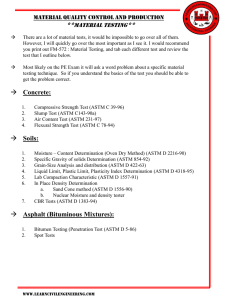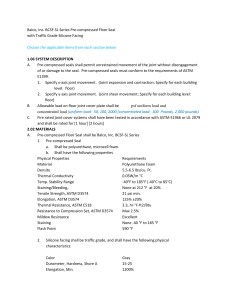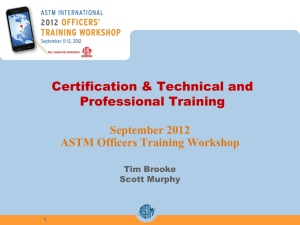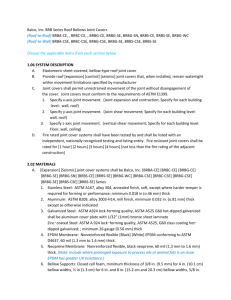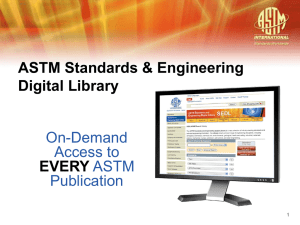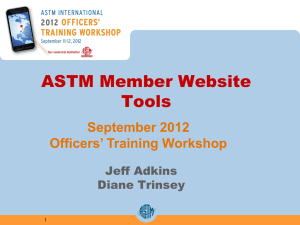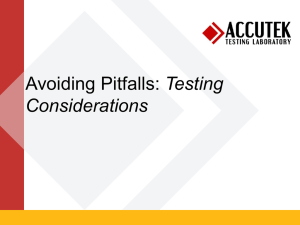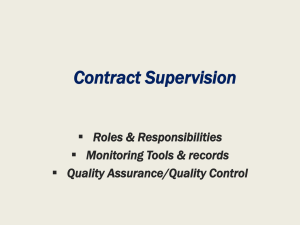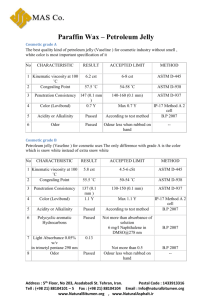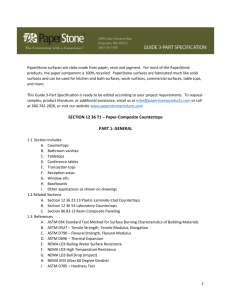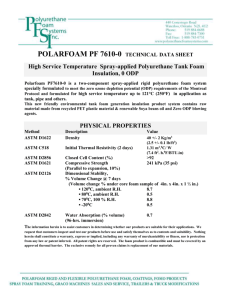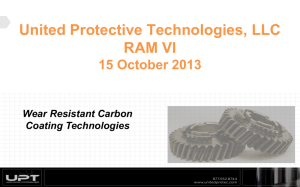MetImage : Image Analysis Software The MetImage LX workstation
advertisement
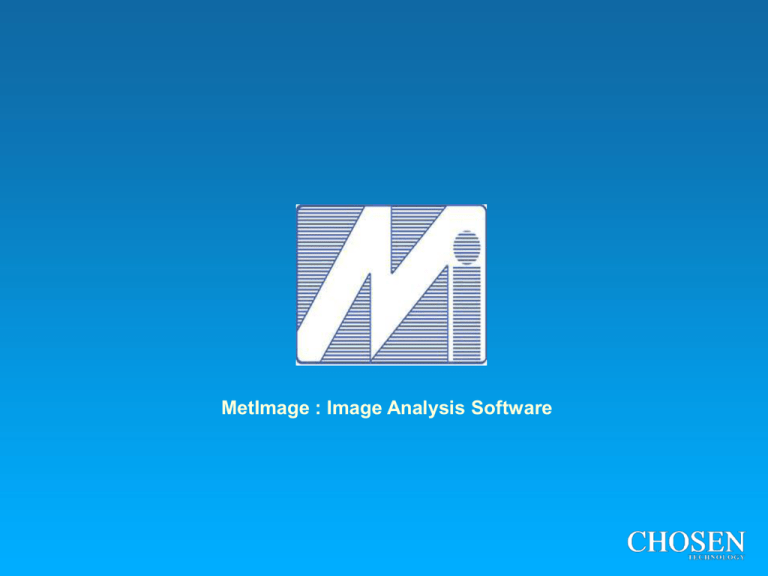
MetImage : Image Analysis Software The MetImage LX workstation is a complete image analysis system developed specifically to increase the speed, accuracy and efficiency of measurements for material sciences and metallography. The MetImage LX incorporates specialized hardware and software that allows you to rapidly scan one or several areas of the sample and perform several measurements. Tedious repetitive manual measurements are totally eliminated greatly reducing operator fatigue and increasing sample throughput. Subjective analysis is reduced thereby increasing accuracy and repeatability. Easy and user friendly interface with minimum clutter on screen. • Monochrome and true color image support. • Capability to analyze images from cameras and scanners with format at least up to 2k x 2k pixels or better. • Has inbuilt drivers for direct image acquisition from frame grabbers and USB / firewire digital cameras. • Live image preview and capture from within the software. • One click image capture and save operation with auto filename generation to enable easy and rapid image capture of several fields from a sample. • Additional inbuilt Twain support for image capture thru Twain compatible image capture devices. • Comprehensive image processing tools for color, gray and binary operations. • Functions include image transformations, image operations, pixel operations, image arithmetic, image processing (Binary, gray scale, color), background subtractions, shading corrections, image filtering, image enhancements ,image segmentation etc. • Binary mask/bit plane support with 16 bit planes. • Capability for manipulating individual binary masks with filters, Boolean, logical operations & feature extractors to derive and extract features/objects from image. • Comprehensive image analysis features. • Minimal user intervention for most analysis to ensure repeatability and accuracy. • Automatic analysis modes to avoid manual tresholding of images.. • Generate customizable reports that can be saved in Microsoft Word format for easy retereival and archiving. User defined or customizable report templates with images and result tables. • Inbuilt transfer of results and raw data to spreadsheets such as Microsoft Excel. ID Field area Pearlite Ferrite other FERPER10 0.2214 47.54 51.85 0.61 General Analysis modules to include • Spatial and intensity calibrations. • Repeatable and accurate spatial calibration with traceable accuracy. • Auto edge detection tools to minimize human error. General Analysis modules to include • Interactive feature measurements tools (line, Trace, Rectangle, Ellipse, Polygon etc.). • Ability to define a measurement set to suit a analysis requirement. General Analysis modules to include • Automated feature measurements with a comprehensive list of size, shape, position, color, texture and skeletal measurements) . ranges/bins • Classification and reporting of features into user definable, • Inter-particle distance measurements for each feature. Materials analysis modules • Grains Size estimation Includes methods as per (ASTM E 112, E 1382, IS 4748) • Phase (Area%, volume fraction) measurements (includes methods as per ASTM E562). • Nodularity (includes method ASTM A 247) • Graphite flake measurements (includes method ASTM A 247) • Coating thickness (Includes ASTM B 487, ISO 1463) • Decarburization depth (Includes ASTM E 1077, ISO 3887) Materials analysis modules • Porosity (Includes ASTM B 276) • Dendritic arm spacing • Carbide banding /distribution (ASTM E1268) • Inclusion Rating (as per ASTM E 1122) Enhance your images using filtering and enhancement features. These specialized features allow you to see important characteristics of the images more clearly Analyze different types of materials images, including grain (edge or color), feature, and phase images. Image processing features • Create gray masks and binary masks (up to 16) from an image for automatic object identification and extracting measurements • Use binary filtering and morphological operators for enhancing an image prior to measurements Spatial Calibration Use reference lengths in image to calibrate images to real world units such as mm, microns etc. Macros • All preprocessing steps could be combined together and run on the image at one stroke by generating a macro. The macro generator has a list of available functions which could be added to the current macro. When a macro is run, the functions in the macro will be run in sequence eliminating the need for step by step manual operations. • Macros can be created for different analysis/sample types Report Generator • The Report generator can be used to generate a complete report that includes images, tables, graphs and a time stamp. • The report format can be customized by the user depending o requirements and can also user modifiable text, captions etc. • Report can also be automatically saved as a Microsoft Word compatible document Measurements Count & Classify (Auto detect) • Using the count & classify you can detect objects in the image that have a distinct contrast with the background (objects are identified based on a user set gray/color threshold range). • The Software counts the objects and performs measurements on them. Objects can be excluded from the count or measurements depending on the user defined measurement range limits. • Over 50 measurements can be selected. Counted objects can also be classified or sorted into different classes for any selected measurement. Measurements Field • With field measurements you can isolate objects in a image having a user defined gray/color range and then obtain measurements such as the total area, area% occupied by the objects, intercepts count, and chord lengths (lengths or breadth x) of the objects. • This module is useful for measuring distance between features, obtaining thickness measurements (such as fiber widths, root thickness or wall thickness etc.) Measurement Modules The following add-on modules are available as options and can be added to Met Image LX • Phase allows the user to measure phase percentages or volume fractions from the image. Up to 48 phases can be measured. • Automatic and semiautomatic interactive methods allow analysis of different sample types Grain size estimation • Analyze grain images and measure the grain structure. Grain sizes can be analyzed and reported according to the ASTM E112 grain size methods Results can also be presented in other formats. • Automatic and semiautomatic interactive methods allow analysis of different sample types. Nodularity measurements Identify and measure graphite nodules. Obtain nodularity, nodule density. Classify nodules on the basis of size. Graphite flake measurements Identify and measure graphite flakes: Obtain %graphite area, Measure and classify graphite flakes according to length. Porosity measurements Identify and measure porosity. Obtain areas, sizes, percentages etc. Coating Thickness Measure cross sectional thickness according to ASTM B487 Decarburisation depth Measure Decarb Depth according to ASTM E 1077 Carbide banding Measure carbide banding levels according to ASTM E1268 Dendritic Arm Spacing To measure the spacing between the Dendrites Inclusion measurements Measure Inclusions according to the ASTM E 45 and ASTM E-1245 method. Both JK Inclusion ratings or second phase constituent method analysis can be performed. For More Information: CHOSEN Technology Co.,Ltd. Tel. 0-2736-2122 (Auto) www.chosen.co.th/metimage
